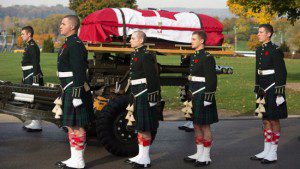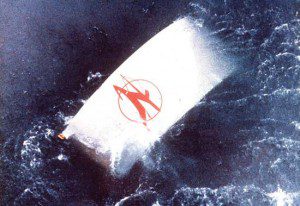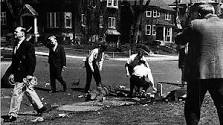
Politicians, police and just plain people have offered a lot of captions to the events in Saint-Jean-sur-Richelieu and Ottawa over the past week. The Prime Minister called the killings of Warrant Officer Patrice Vincent and Corporal Nathan Cirillo an attack on Canada’s democracy. Law enforcement officials referred to the murders as “lone-wolf terrorism.” And friends of mine have said it was an assault on this country’s innocence. A paramedic who joined those watching Cpl. Cirillo’s body pass on Hwy 401 last Friday summed it up:
“I never expected to be standing here for a Canadian soldier killed on our own soil,” Roger Litwiller told the Toronto Star.
He went on to say that the incident didn’t happen on the First and Second World War battlefields of Europe or in the Middle East against the Taliban or ISIS terrorists. No, Litwiller said, it had happened here “where we live.”

But what about that innocence? I actually believe this country lost much of its innocence on a spring night in 1985, when members of Babbar Khalsa, a Sikh militant group, planted a bomb aboard Air India Flight 182. The resulting explosion over the Atlantic Ocean – the first bombing of a 747 jumbo jet – killed 286 Canadians, 27 Britons and 24 Indian citizens.
In the 25 years that followed, numerous investigations focused on Sikh extremists groups operating in Canada, the U.K., the U.S. and India. Investigators drew up lists of at least eight different suspects, all with connections to Canadian locations and terrorist cells. Trials and convictions in Canada resulted. And in June 2005, then Prime Minister Paul Martin summed up the reality of the attack.
“Make no mistake,” Martin said. “The flight may have been Air India’s. It may have taken place off the coast of Ireland. But this is a Canadian tragedy.”
Furthermore, while some of Canadians may still believe this is a nation practising only peacemaking and peacekeeping, I think that tradition is long past. Our decisions to join NATO operations in Afghanistan for a dozen years, our participation to the joint air-operations against Muammar Gaddafi’s in 2011, and now the coalition involving Canada’s F-18s bombing ISIS operations in Iraq (and possibly Syria) have indeed left this country far from neutral, but an active participant in a war against terror.
This week, I was listening to a conversation involving a number of historians, journalists and political scientists about an even greater “terrorist attack” on Canadian soil. Indeed, it came to a head 44 years ago this month. At the time, the movement for Quebec sovereignty and support for the separatist provincial Parti Quebecois were in their infancy.

But a core group of Quebec nationalists – Front de liberation du Québec – emerged to press for independence and separation from Canada. Indeed, they went so far as to detonate nearly 100 bombs in mailboxes. Then on Oct. 5 one FLQ cell kidnapped British Trade Commissioner James Cross from his home. Five days later, as the FLQ demanded the publication and broadcast of its manifesto, another cell kidnapped Pierre Laporte, Quebec’s minister of labour.
The “October Crisis” came to a head on Oct. 16 when Quebec Premier Robert Bourassa called on the federal government to enact emergency powers of search and arrest. Prime Minister Pierre Trudeau responded by implementing the War Measures Act, which suspended all civil liberties and gave wide-ranging powers of arrest to police. At the time, columnist and politician (later Quebec Premier) René Lévesque denounced the “acts of terrorism,” but added:
“Until we receive proof of the size of the revolutionary army to the contrary, we will believe that such a minute, numerically unimportant fraction is involved, that rushing into the enactment of the Act (is) panicky and altogether excessive reaction.”
Excessive or not, on Oct. 17, Pierre Laporte’s body was found strangled and stuffed in a trunk. And over zealous English-speaking editorialists and commentators claimed the country was on the verge of civil war. Eventually, police homed in on the murderous cell and negotiated James Cross’s freedom with the other.

As an indication of the national sentiment, however, a December 1970 Gallup Poll revealed that 89 per cent of English-speaking Canadians supported the implementation of the War Measures Act, as did 86 per cent of French-speaking Canada. Ultimately, 497 people were arrested in the sweep to find the kidnappers (although all but 62 were later released without charges). And remember the exchange between CBC reporter Tim Ralfe and Prime Minister Trudeau on the steps of Parliament Hill about the confrontation?
“It is more important to keep law and order in the society than to be worried about … (soldiers and police in the streets) with helmets and guns,” Trudeau said.
“At any cost?” asked Ralfe. “How far would you go with that?”
“Well, just watch me!”
With all due respect to the murders of two dedicated reservists over the past week, I think Canada’s innocence was lost a long time ago.
Hello Ted,
Thank you for quoting me in your article, Loss of Innocence. It was a difficult time for all Canadians and as a Paramedic in Trenton, I have stood at the gateway to the Highway of Heroes many times.
I have enjoyed your recent book, The Great Escape. Will you be attending the Dundurn event on 15 January 2014? If so, I would like to get my copy signed.
I have a lecture in Belleville and book signing in the morning and will be heading to Toronto in the afternoon. I hope we can meet.
With your permission, I would like to post a link to this article on my social media.
I can be contacted at litwillerroger@gmail.com.
I am looking forward to meeting a fellow Dundurn author.
Cheers,
Roger